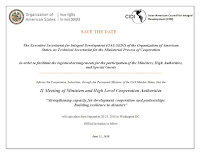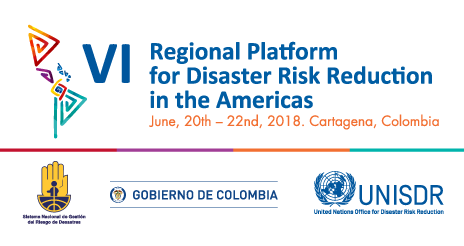II Meeting of Ministers and High-Level Cooperation Authorities "Strengthening capacity for development cooperation and partnerships: Building resilience to disasters" to take place from September 20-21, 2018 in Washington, D.C.
 The Executive Secretariat for Integral Development of the Organization of American States (OAS-SEDI), as technical secretariat for the ministerial process of cooperation in order to facilitate the logistical arrangements for the participation of ministers, high authorities, and special guests informs the Cooperation Authorities, through the Permanent Missions of the OAS Member States, that the second meeting of ministers and high-level cooperation authorities "Strengthening capacity for development cooperation and partnerships: Building resilience to disasters" will take place from September 20th to the 21st, 2018 in Washington D.C.
The Executive Secretariat for Integral Development of the Organization of American States (OAS-SEDI), as technical secretariat for the ministerial process of cooperation in order to facilitate the logistical arrangements for the participation of ministers, high authorities, and special guests informs the Cooperation Authorities, through the Permanent Missions of the OAS Member States, that the second meeting of ministers and high-level cooperation authorities "Strengthening capacity for development cooperation and partnerships: Building resilience to disasters" will take place from September 20th to the 21st, 2018 in Washington D.C. What happened this week?
Beryl Becomes 'Very Tiny' First Hurricane Of Atlantic Season
 The Category 1 hurricane Beryl, the first of the 2018 Atlantic season, strengthened from a tropical depression to a hurricane within 24 hours. By midday Friday, Beryl was churning about 1,000 miles east of the Lesser Antilles in the eastern Caribbean; it's expected to reach land by late Sunday or early Monday. Forecasters say the storm is likely to maintain its hurricane status as it approaches and crosses the islands. "It is possible that we could have hurricane watches up for some of those islands by tonight," said Robbie Berg, a hurricane specialist at the National Hurricane Center. Beryl had maximum sustained winds of 80 mph on Friday afternoon as it churned across the water. "The hurricane force winds only extend outwards about 10 miles from the center, and the eye itself is about 5 miles wide" Berg said. "So that's just a very tiny system. We don't see many hurricanes that small." And yet, Berg said the conditions ahead of Beryl could allow it to strengthen a bit over the next few days as it heads for the island chain extending from the Virgin Islands to Grenada...Read more
The Category 1 hurricane Beryl, the first of the 2018 Atlantic season, strengthened from a tropical depression to a hurricane within 24 hours. By midday Friday, Beryl was churning about 1,000 miles east of the Lesser Antilles in the eastern Caribbean; it's expected to reach land by late Sunday or early Monday. Forecasters say the storm is likely to maintain its hurricane status as it approaches and crosses the islands. "It is possible that we could have hurricane watches up for some of those islands by tonight," said Robbie Berg, a hurricane specialist at the National Hurricane Center. Beryl had maximum sustained winds of 80 mph on Friday afternoon as it churned across the water. "The hurricane force winds only extend outwards about 10 miles from the center, and the eye itself is about 5 miles wide" Berg said. "So that's just a very tiny system. We don't see many hurricanes that small." And yet, Berg said the conditions ahead of Beryl could allow it to strengthen a bit over the next few days as it heads for the island chain extending from the Virgin Islands to Grenada...Read more  The 10th International Congress on Disasters was held in Cuba this Tuesday to strengthen collaboration in preparing and protecting countries against the risks of adverse climatic events. Major General Ramon Pardo, head of the National General Staff of Civil Defense, said that the event's organization shows Cuba's interest in gathering authorities, scientists and professionals from all over the world dedicated to work to reduce disaster risks. Pardo also pointed out the event aims to exchange knowledge and results on good practices, as well as to showcase experiences of the work being done in the Caribbean nation to reduce vulnerabilities and build resilience....Read more
The 10th International Congress on Disasters was held in Cuba this Tuesday to strengthen collaboration in preparing and protecting countries against the risks of adverse climatic events. Major General Ramon Pardo, head of the National General Staff of Civil Defense, said that the event's organization shows Cuba's interest in gathering authorities, scientists and professionals from all over the world dedicated to work to reduce disaster risks. Pardo also pointed out the event aims to exchange knowledge and results on good practices, as well as to showcase experiences of the work being done in the Caribbean nation to reduce vulnerabilities and build resilience....Read more Climate Change Tops Agenda at CARICOM Leadership Transfer
The Chairmanship of the Caribbean Community (CARICOM) today passed to Jamaica's Prime Minister from Haiti's President Jovenel Moïse, who concluded his 6-month leadership of the regional bloc. Mr. Moïse, during his term as Chairman, prioritized disaster preparedness and rallied regional and global support for innovative financing for risk management efforts for Caribbean countries - particularly in seeking funding for a regional sovereign disaster insurance program called the Caribbean Catastrophe Risk Insurance Facility (CCRIF). Through CCRIF, governments can access funds swiftly following a disaster striking. Following Mr. Moïse's leadership on the issue, climate disaster risk management and insurance are now permanent agenda items at CARICOM. He also renewed commitment toward strengthening the Caribbean Disaster and Emergency Management (CDEMA). ...Read more
Regional Platform Advances Sendai Framework Implementation in the Americas
 The Sixth Regional Platform on Disaster Risk Reduction (DRR) in the Americas which convened from 20-22 June in Cartagena, Colombia, concluded with the adoption of the Cartagena Declaration. The Cartagena Declaration aims to spark an increase in the number of national and local strategies for disaster reduction in the region by 2020. It calls for integrating DRR in all activity areas to promote more resilient communities and reduce vulnerability in the region, and urges UNISDR to continue providing institutional support for implementation, monitoring and review of DRR in the Americas and the Caribbean. The event provided the space for actors in the region to exchange experiences regarding implementation of the Regional Action Plan, a guide for implementing the Sendai Framework in the Americas, which aims to align regional, national and local strategies with the Sendai Framework, and accelerate country-level implementation of the DRR agenda... Read more Read the Cartagena Declaration
The Sixth Regional Platform on Disaster Risk Reduction (DRR) in the Americas which convened from 20-22 June in Cartagena, Colombia, concluded with the adoption of the Cartagena Declaration. The Cartagena Declaration aims to spark an increase in the number of national and local strategies for disaster reduction in the region by 2020. It calls for integrating DRR in all activity areas to promote more resilient communities and reduce vulnerability in the region, and urges UNISDR to continue providing institutional support for implementation, monitoring and review of DRR in the Americas and the Caribbean. The event provided the space for actors in the region to exchange experiences regarding implementation of the Regional Action Plan, a guide for implementing the Sendai Framework in the Americas, which aims to align regional, national and local strategies with the Sendai Framework, and accelerate country-level implementation of the DRR agenda... Read more Read the Cartagena Declaration  Cuba and Haiti agreed to consolidate their collaboration in disaster risk reduction management through sharing knowledge and training as part of South-South cooperation.
Cuba and Haiti agreed to consolidate their collaboration in disaster risk reduction management through sharing knowledge and training as part of South-South cooperation.According to authorities of the United Nations World Food Program (WFP), both nations maintain similar levels of exposure to natural phenomena such as hurricanes, cyclones and drought. Cuba has accumulated experiences and methodologies to reduce the negative impacts of these disasters, and among Cuba's contributions to Haiti is the strengthening of hydro meteorological surveillance through the transfer of tools to improve monitoring and forecasting of events. Channels and communication routes have been identified to ensure that participants at all levels receive the information generated by the monitoring institutions in a timely manner. Also, Haitian technicians were trained in the monitoring of extreme weather events, and Haiti improved its hurricane monitoring and forecasting capabilities, which facilitates decision-making... Read more
Cuba, Dominica Strengthen Bilateral Ties, Agree to Work on Disaster Preparedness
 Cuban head of state, Miguel Diaz-Canel, and the Dominican Prime Minister Roosevelt Skerrit met at the Presidential Palace in Havana Tuesday as the countries work to strengthen bilateral ties and collaborate on disaster preparedness initiatives. During the meeting, Skerrit thanked the Cuban government for the assistance it offered when Dominica was battered by hurricane Maria last year. Cuba was among the countries to provide aid to the island, sending rescue workers, doctors, construction personnel and other staff in the post-Hurricane Maria recovery efforts that devastated the Caribbean island last year. Cuban and Dominican specialists have agreed to work on one of Dominicans' main issues, flash flooding, and lay down a strategy to reduce the impact heavy rains have on the country's drainage system. In June, Cuba sent a contingent of 80 builders and engineers to repair schools and homes, in response to the government's request to continue with the process of recovering from the damage caused by Hurricane Maria... Read more
Cuban head of state, Miguel Diaz-Canel, and the Dominican Prime Minister Roosevelt Skerrit met at the Presidential Palace in Havana Tuesday as the countries work to strengthen bilateral ties and collaborate on disaster preparedness initiatives. During the meeting, Skerrit thanked the Cuban government for the assistance it offered when Dominica was battered by hurricane Maria last year. Cuba was among the countries to provide aid to the island, sending rescue workers, doctors, construction personnel and other staff in the post-Hurricane Maria recovery efforts that devastated the Caribbean island last year. Cuban and Dominican specialists have agreed to work on one of Dominicans' main issues, flash flooding, and lay down a strategy to reduce the impact heavy rains have on the country's drainage system. In June, Cuba sent a contingent of 80 builders and engineers to repair schools and homes, in response to the government's request to continue with the process of recovering from the damage caused by Hurricane Maria... Read more
No comments:
Post a Comment